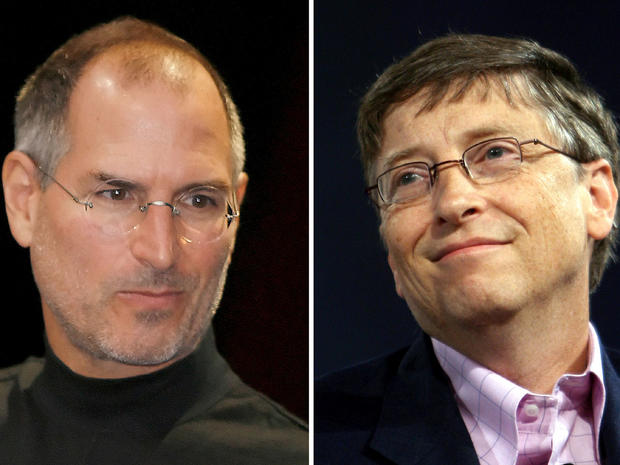Steve Jobs and Bill Gates: It's complicated
This post originally on CNET and was written by Jay Greene. View the original here.
In reflecting on Steve Jobs' tenure at Apple, it's impossible to separate the role Microsoft played.
The companies, as well as Jobs and Microsoft's co-founder Bill Gates, helped pioneer the industry and define an era. The two executives partnered at various times, competed all the time and challenged one another in ways that helped shape the landscape of techdom. It's a complex relationship.
In the early days of computing, Apple depended on software from Microsoft for its Macintosh computer. There's a charming 1983 video, aired in an edited form for the D: All Things Digital Conference in 2007, in which Jobs hosts a "Dating Game" with software execs including Gates. It's a love fest with Gates commenting that the Mac "really captures people's imagination" and Jobs deciding in the end that he need all of the executives support, including Gates'.
As Microsoft climbed to the top of the computing industry and Apple became more marginalized in the late 1980s, the gloves came off. In 1988, Apple sued Microsoft for infringing on the patents regarding the look and feel of its operating system. Over years of litigation, Microsoft won rulings that whittled away almost all of Apple's claims.
End of an era: Steve Jobs resigns as Apple CEOPhotos: The life of Steve Jobs
Apple's new CEO, Tim Cook, a business "maestro"
ZDNet: Jobs' legacy as CEO
By 1997, Apple's fortunes had sunk so low that it reached out to its sometime partner, sometime nemesis for a hand. Gates appeared via satellite at the Macworld conference that year, agreeing to invest $150 million in Apple and to develop and ship future versions of its Microsoft Office, Internet Explorer, and development tools for the Macintosh. The companies also settled remaining claims in their patent dispute.
That investment, which surely paid off for Microsoft over the years, also helped Apple regain financial footing. And it helped Jobs move forward on the job of turning around Apple and ultimately making it the most valuable company in technology.
Along the way, Jobs often sparred with Microsoft, criticizing the company's lack of creativity.
"The only problem with Microsoft is they just have no taste," Jobs said in the 1996 public television documentary Triumph of the Nerds. "They have absolutely no taste. And I don't mean that in a small way, I mean that in a big way, in the sense that they don't think of original ideas, and they don't bring much culture into their products."
In a New York Times article that ran after the documentary aired, Jobs disclosed that he called Gates afterward to apologize. But only to a degree.
"I told him I believed every word of what I'd said but that I never should have said it in public," Jobs told the Times. "I wish him the best, I really do. I just think he and Microsoft are a bit narrow. He'd be a broader guy if he had dropped acid once or gone off to an ashram when he was younger."
At the time, and for many years after, those words often seemed like sour grapes from an executive whose company had been surpassed in so many ways by Microsoft. But in the end, Jobs proved his vision right. His design chops and vision helped launch the iPod, the iPhone and the iPad, industry changing products that turned Apple into a more profitable and more valuable company than Microsoft.
